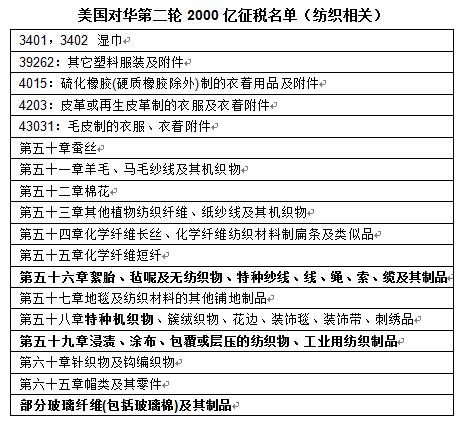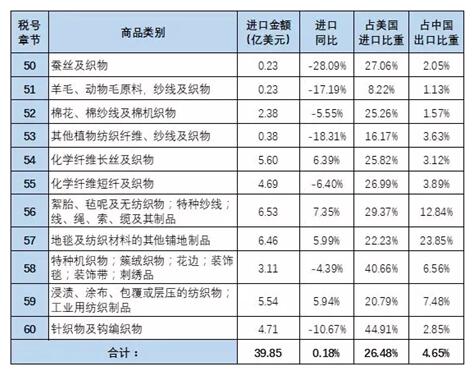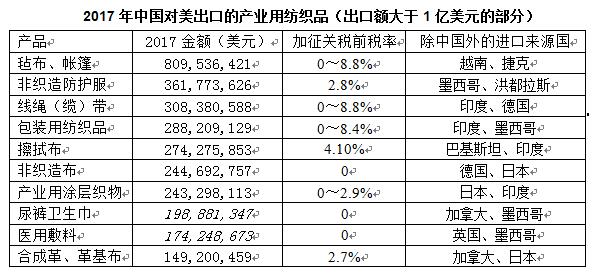 Click: 2018-08-06
Click: 2018-08-06
On July 6, the United States formally imposed a 25 percent tariff on $34 billion of Chinese products, followed by a 25 percent tariff on U.S. goods of the same size.This round of Chinese tariffs includes cotton, an important raw material for the textile industry.
On July 11, the United States announced that it would impose a 10% tariff on 200 billion goods from China. The tariff will cover more than 6,000 products with tax codes. The tariff list is 205 pages long, covering fiber, textile materials, hats, glass fiber fabrics and other textile products.

一、 棉花關(guān)稅對(duì)行業(yè)的影響
2017年我國(guó)消耗的棉花755萬(wàn)噸,進(jìn)口棉花115萬(wàn)噸,其中50.53萬(wàn)噸來(lái)自于美國(guó),占比達(dá)44%。在配額內(nèi)關(guān)稅將由1%增加至26%,每噸的進(jìn)口成本增加3500元以上。產(chǎn)業(yè)用紡織品企業(yè)中,襯布、篷帆企業(yè)有一定的用棉量,部分企業(yè)使用美棉,關(guān)稅增加后會(huì)給企業(yè)產(chǎn)生影響,但可以通過(guò)進(jìn)口棉紗來(lái)部分化解。行業(yè)內(nèi)純棉水刺非織造布企業(yè)直接使用棉花,美棉關(guān)稅上升會(huì)給這些企業(yè)的成本帶來(lái)較大影響;目前我國(guó)純棉非織造布的產(chǎn)能在7萬(wàn)噸左右,棉花需求量相對(duì)于傳統(tǒng)棉紡相比要小很多,可以轉(zhuǎn)而使用其他地區(qū)的產(chǎn)品來(lái)替代美棉。因此美棉進(jìn)口關(guān)稅上漲,短期內(nèi)對(duì)產(chǎn)業(yè)用紡織品的影響不會(huì)很明顯。

Ii. Impact of the second round of tariff surcharge
According to the preliminary arrangement of the International Production Capacity Cooperation Alliance of Chinese Textile Enterprises, the products subject to the 10% tariff this time involve almost all the products in CHAPTER HS50-60.It includes all yarns, fabrics/fabrics of various raw materials (cotton, wool, silk, linen and chemical fibers), industrial textiles and a portion of textile machinery products, with an annual export value of about $4 billion to the US.

本輪2000億關(guān)稅,涉及到幾乎所有的產(chǎn)業(yè)用紡織品,但是以下產(chǎn)品不在目錄清單中:

In 2017, China exported $3.74 billion worth of industrial textiles to the United States, which is the largest export market of China's industrial textiles, accounting for 15.4% of China's total export. China is not very dependent on the American market.

Among the major products listed in the table above, China is the largest exporter of the United States, but the share of Chinese products in the import market of the United States is not very high. Developed countries such as Germany and Japan, emerging developing countries such as Vietnam and India, and neighboring countries such as Canada and Mexico all export a lot to the United States.For example, The share of Chinese nonwovens in the import market of the United States is 22.7%, while that of Germany, Japan, Canada and Mexico reaches 33%.
The 10% tariff will have a significant impact on the export of industrial textiles to the US.Nonwoven fabric, for example, the import tariff rate of the nonwoven fabric is 0, nonwoven products in China after imposing a 10% tariff, China products price advantage will decline, and Europe and the United States, the company also sped up the investment in the us market layout, to some extent, these all can affect the export of nonwovens industry in our country, is likely to change for a long time of nonwovens structure of global supply chains.Important nonwoven products such as medical dressings, nonwoven protective suits and diapers sanitary napkins are not included in this list, which alleviates the pressure on the domestic nonwoven industry to some extent.
Felt cloth, tent, cable (cable) belt, industrial coated fabric, synthetic leather, leather base cloth and other industries in China have technological and cost advantages. It is difficult for other developing countries to establish a complete industrial chain to challenge our market position.
Therefore, the 10% tariff imposed by the US on 200 billion Chinese goods will have a controllable impact on the export of China's industrial textile industry in the short term, but may change the global supply chain system in the long term. Therefore, the industry, especially the backbone enterprises, should pay attention to and consider countermeasures in advance.
(Source: China Industrial Textile Industry Association)
 Address:No. 2 Li an Ring Road, Wangcun Industrial Zone, Songyang County, Lishui City, Zhejiang Province
Address:No. 2 Li an Ring Road, Wangcun Industrial Zone, Songyang County, Lishui City, Zhejiang Province
 Tel: +86 0578-8818980
Tel: +86 0578-8818980
 Fax: +86 0578-8818019
Fax: +86 0578-8818019
 Web: www.epvalley.com
Web: www.epvalley.com
Scanning Right Two-Dimensional Code Concern
Wechat Public Number:云中馬股份
Scan the right two-dimensional code to browse the mobile website
www.epvalley.com